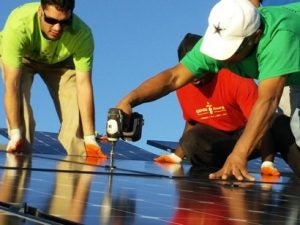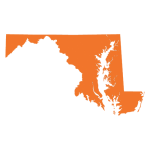Solar for all
What is solar for all?
Solar has been unfairly painted as a technology reserved only for hardcore environmentalists and the wealthy. In reality, people of all political stripes and incomes can and should be able to benefit from solar energy.

The price of solar prices has fallen by more than 50 percent since 2010. This precipitous price drop, coupled with new financing options, is making solar accessible for an increasing portion of the population. In fact, in most of the 50 largest U.S. cities producing electricity with rooftop solar is now cheaper than buying electricity from your utility.
🌞 SUPPORT OUR WORK 🌞
Make a tax-deductible donation today to Solar United Neighbors to help more people go solar, join together, and fight for their energy rights.
Everyone should have access to solar
Across the country, communities are developing project models and policies to scale low-income solar deployment quickly and broadly. These projects can’t come soon enough. Nationwide, low-income families spend nearly 7.2 percent of household income on utilities. That’s more than twice as much as middle-income families and three times as much as higher-income families. This strains already tight budgets and makes families significantly more susceptible to rising energy costs.

As we go through an energy transition, it is critical to emphasize equity as well as decarbonization. If a family can save money on electricity, it is better able to cover other basic needs, including food, housing, education, and medical expenses. Pushing for increased solar adoption goes hand in hand with fighting utility cut-off policies, low income tariffs, fixed charges, and other regressive energy policies.
Rooftop solar provides broad community benefits in addition to helping families save money. This includes creating local jobs, sparking economic growth, increasing property values, and lowering pollution levels. In short, solar provides significant benefits to the members of society that need them most.
One major challenge to expanding solar for all is the complexity of reducing bills for residents living in rental units, apartment buildings where each unit does not have its own electric meter (i.e., master metered buildings), or in public or subsidized housing where rental and utility rates are combined. Other common challenges include lack of access to capital, less ability to utilize tax credits, and greater roofing and siting issues.
Although it may not be easy to bring solar to low-income rural and urban communities, Americans are tired of waiting. Communities are developing their own projects, and local governments are responding with better policies and assistance. Policies such as community solar go a long way toward making solar accessible and affordable for all.
Solar for all resources
These resources lay out why solar for low-income families is so important and describe some of the effective policy measures needed to make Solar for All a reality.
- Low-income Solar Policy Guide – This excellent website provides tools and resources including cases studies and policy evaluations for policymakers, community leaders, and others working to increase solar access.
- Making solar energy more accessible to lower income Americans – This series of reports and recommendations comes from the George Washington Solar Institute.
- Expanding access to solar energy for all American households – This video covers an event put on by the Center for American Progress and the NAACP discussing solar’s impacts on low-income populations and how to ensure equitable access to renewable energy.
- Resilience for free: How solar+storage could protect multifamily affordable housing from power outages at little or no net cost – A report from Clean Energy Group on the benefits of solar + storage projects.
- The power of energy efficiency: Building a stronger economy for Appalachia (Part 1) – From Appalachian Voices, this series discusses energy efficiency, but many of the same arguments apply to solar.
- From power to empowerment: Plugging low income communities into the clean energy economy – From Groundswell, a useful overview of the need for expanding solar access.
Pilot projects
 Several solar pilot programs and creative initiatives make solar accessible for low-income consumers. Some organizations, such as GRID Alternatives, have been offering ongoing programs aimed at bringing solar to low-income families or creating solar installation job training programs. Others are pilot programs that have tested various approaches to implementing low-income solar. The following is an incomplete list of low-income solar initiatives and models we’ve gathered. If you know of additional programs or models, please let us know!
Several solar pilot programs and creative initiatives make solar accessible for low-income consumers. Some organizations, such as GRID Alternatives, have been offering ongoing programs aimed at bringing solar to low-income families or creating solar installation job training programs. Others are pilot programs that have tested various approaches to implementing low-income solar. The following is an incomplete list of low-income solar initiatives and models we’ve gathered. If you know of additional programs or models, please let us know!
- Solar Holler – A social enterprise located in West Virginia, Solar Holler works to bring local clean energy to Appalachia’s community organizations, nonprofits, farms, and low-income residents. Solar Holler spun off of Solar United Neighbors of West Virginia (then called WV SUN) in 2014. Before founding Solar Holler, Dan Conant led Solar United Neighbors programs in Virginia and West Virginia. Now, he and his team develop solar and energy efficiency projects for West Virginia organizations and use local job trainees from Coalfields Development Corporation.
- GRID Alternatives – A non-profit solar installer based in California, with regional offices around the US. GRID Alternatives leads teams of volunteers and job trainees who install solar electric systems exclusively for low-income homeowners. The installations provide needed savings for families struggling to make ends meet, prepare workers for jobs in the fast-growing solar industry, and reduce carbon emissions.
- Nebraskans for Solar Energy – Nebraskans for Solar’s mission is to develop a statewide solar powered low-income housing program in partnership with our supporters and other nonprofits that build or rehabilitate low-income housing. In November 2013, Nebraskans for Solar and Habitat for Humanity of Omaha raised funds to install solar hot water systems on two efficient, Energy Star-rated Habitat for Humanity houses in Omaha. They are currently the only two solar-powered Habitat for Humanity houses in Nebraska. The organization continues to fundraise to put solar projects on Habitat homes and help local schools go solar.
- New Vision Renewable Energy – A nonprofit located in Philip, WV, New Vision works locally and globally with faith-based and community organizations to get renewable products into the hands of the people who will benefit the most. They organize time banks and community “barn raisings” to help low-income families go solar and save on their electric bills. Read our detailed profile of New Vision Energy’s work in West Virginia.
- Renewable Energy and Electric Vehicle Association (REEVA) – Located in Fincastle, Virginia, REEVA is a do-it-yourself club that helps members build solar/wind installations and electric vehicles at home, lowering the price of a project by removing labor costs. It also installs solar systems on community buildings and provides solar installation training to create jobs in rural communities.
- Plymouth Area Renewable Energy Initiative – Located in Plymouth, NH, PAREI’s mission is to encourage energy conservation and energy efficiency practices and to promote the use of renewable energy in the Plymouth region. They organize solar “barn raisings” to help low-income community members go solar at no cost.
- Solar Richmond – A nonprofit founded in 2006 in Richmond, California, Solar Richmond offers free solar training, staffing services leading to temporary and permanent employment, and green business ownership opportunities for low income and under-employed residents. As a solar and green-jobs advocate, they work with partners to promote solar and inclusive green economic development in Richmond and the Bay Area.
- Evergreen Cooperatives – Launched in 2008 by several Cleveland-based institutions (including the Cleveland Foundation, the Cleveland Clinic, University Hospitals, Case Western Reserve University, and the municipal government), Evergreen Cooperatives create living wage jobs in six low-income neighborhoods in the Greater University Circle area. One initiative, Evergreen Energy Systems (E2S), designs, installs, and develops solar arrays for institutional, governmental, and commercial markets. E2S is 100 percent owned by its workers, who live in the City of Cleveland and face barriers to employment.
- RREAL – RREAL is dedicated to making solar energy accessible to communities of all income levels. It has been pioneering the use of solar energy to address fuel poverty throughout the nation. RREAL accomplishes its mission primarily through its Solar Assistance program which provides residential solar energy systems to low-income families on public energy assistance as a lasting, clean, and domestic solution to fuel poverty.
- Citizen Energy – A nonprofit in Imperial, CA, Citizens Energy installs solar systems on the homes of low-income customers of the electric utility’s Imperial Irrigation District. Citizen Energy partnered with San Diego Gas and Electric to co-develop the Sunrise Powerlink transmission line to provide more power to the Imperial Valley in CA. Revenue from the transmission line project helps fund the low-income solar installations.
Learn more
We’ve compiled additional information about solar for all in some states. Are you looking for information that isn’t covered here? Contact us.
Help Support Our Work
Donate now to support our work to make solar power more accessible to all.



